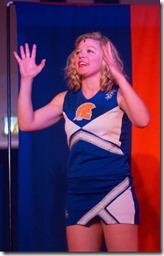
Low-stakes, problematic adaptation
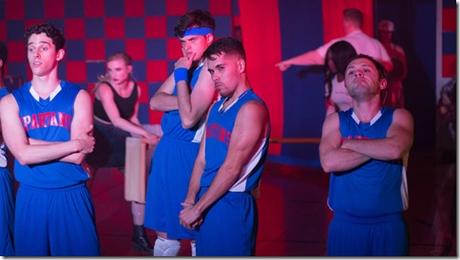
Review by Lauren Whalen
Aristophanes' comedy serves as entertaining and feminist social commentary. Frustrated and deeply affected by the tragedies of the Peloponnesian War, the women of Athens collectively refuse to have sex with the men until conditions improve. What makes Lysistrata so powerful is its stakes: lives are being lost due to needless violence, and the Athenian women use the only weapon they have to enact positive change. Spike Lee's recent film Chiraq took Lysistrata to the modern-day South Side of Chicago, replacing an epic Greek war with equally epic gang violence. The stakes in Lysistrata Jones ? Basketball. More specifically, a small college basketball team that no one cares about, including the players, until a sassy transfer student takes matters into her own hands. Refuge Theatre Project's Lysistrata Jones is an incredibly weak adaptation with a flimsy presence, clumsy dialogue and a particularly painful sound design in its gymnasium setting.

Despite the fact that Lysistrata Jones centers around sex and lack thereof, the S word is uttered once, maybe twice, in the course of the two-hour play. Playwright Beane has no qualms, however, about the word "whore," which is used many, many times in dated and degrading ways to describe the sex workers just outside of town. There are virtually no explanations as to why women would suddenly flock to and follow a new girl who doesn't seem to like their boyfriends or what their school stands for, nor does Lysistrata ever turn to the poetry or activist hobbies of her other friends as a means of purpose. No, she'd rather steamroll college kids who seem perfectly content. Characters are stereotypical and lazily drawn, including a Jewish basketball player who likes to "act Black." If you remember that archetype from the 1990s, rest assured it's even less funny and more offensive in 2017. With a few exceptions, Lewis Flinn's score is grating, made worse by the terrible acoustics of Unity Lutheran Church's gym. The original off-Broadway production of Lysistrata Jones was also staged in a gym, but one that frequently hosts performances, and likely with a more experienced sound designer who knows how to make song lyrics audible while preventing microphone screeches. At least we weren't sitting on bleachers.
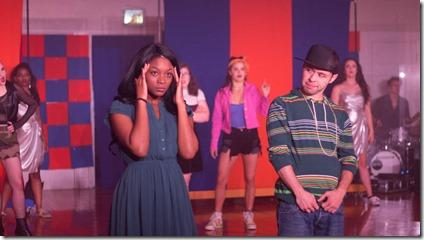
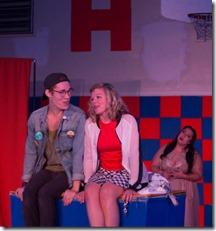
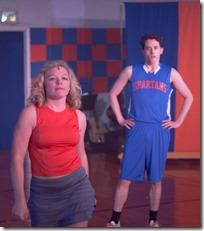
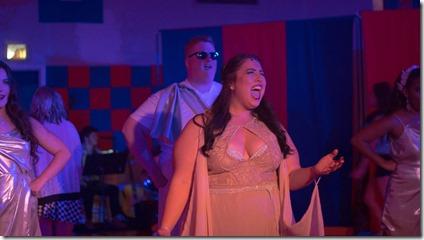
Director Justin Brill and choreographer Shanna VanDerwerkerare a husband-and-wife team of Broadway veterans who now reside permanently in Chicago. While I can't speak for Brill's onstage talent, directing is a separate, specific skillset, and judging from the odd staging and pacing of Lysistrata Jones , not one he possesses, at least not yet.. VanDerwerker's choreography is sloppy - when she doesn't seem to be directly plagiarizing pop music videos from the late 1990s. Only three performances stand out and make the show borderline bearable. As the story's narrator, the goddess Hetaira, Gina Francescais a gorgeous force of nature, projecting diva energy and killer vocals. Maisie Rose is sweet and relatable as campus feminist and slam poet Robin, and Mollyanne Nunn's Lampito, a reluctant but confident cheerleader with a type-A boyfriend, is dynamic and fun to watch.
Refuge Theatre's engaging and energetic High Fidelity was one of my favorite shows of 2016, and enjoyed a successful remount this past year. Just a few months ago, Pride Films & Plays staged Douglas Carter Beane's , a colorful and thoughtful look at gay performers in the era of vaudeville and burlesque. Unfortunately, with Lysistrata Jones, both Refuge and Beane miss the mark by a long shot. There is very little to like about such a problematic adaptation.
Lysistrata Jones continues through November 19th at Unity Lutheran Church, 1212 W. Balmoral (map), with performances Thursdays-Saturdays at 8pm, Sundays 6pm. Additional matinee Saturday, November 18th at 4pm. Tickets are $25, and are available at Eventbrite.com (check for availability of ). More information at RefugeTheatre.com. (Running time: 2 hours, includes an intermission)
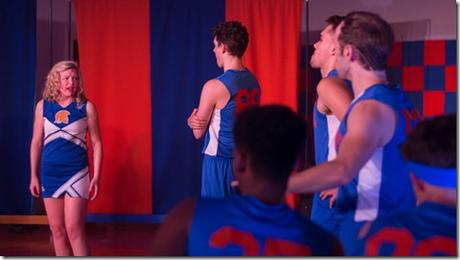
Photos by Zeke Dolezalek
Mary-Margaret Roberts (Lysistrata Jones), Gina Francesca (Hetaira), Collin Sanderson (Mick), Kaleb Van Rijswijck (Xander), Maisie Rose (Robin), Jayla Williams-Craig (Myhrrine), Ryan Armstrong (Cinesias), Mollyanne Nunn (Lampito), Dwayne Everett (Tyllis), Kyra Sorce (Cleonice), Xavier Euzarraga (Uardo), Miles Blim (Harold), Brandy Miller, Michelle Bester, Merrick Robison , Maurice Rex Randle (ensemble), Raymond Goodall (Male Swing, DC), Tuesdai B. Perry (Female Swing)
Annabelle Revak (keyboard), Kalen Smith (bass guitar), Jules Cunningham (guitar), Will Wyatt (drummer)
behind the scenes
Justin Brill (director), Shanna VanDerwerker (choreographer), Annabelle Revak (music director), Lindsey Marsland (assistant director), Evan Frank (set design), Brian Duncan (costume design), Collin Helou, Jennifer Kules (lighting design), Isaac Mandel (sound design), Kate Leslie (stage manager), Margaret deVeer (assistant stage manager), Zeke Dolezalek (photos)
Tags: 17-1046, Annabelle Revak, Aristophanes, Brandy Miller, Brian Duncan, Chicago musical theater, Chicago Theater, Chiraq, Collin Helou, Collin Sanderson, Douglas Carter Beane, Dwayne Everett, Evan Frank, Gina Francesca, Isaac Mandel, Jayla Williams-Craig, Jennifer Kules, Jules Cunningham, Justin Brill, Kaleb Van Rijswijck, Kalen Smith, Kate Leslie, Kyra Sorce, Lauren Whalen, Lewis Flinn, Lindsey Marsland, Maisie Rose, Margaret deVeer, Mary-Margaret Roberts, Maurice Rex Randle, Merrick Robison, Michelle Bester, Miles Blim, Mollyanne Nunn, post, Raymond Goodall, Refuge Theatre Project, Ryan Armstrong, Shanna Vanderwerker, Tuesdai B. Perry, Unity Lutheran Church, Will Wyatt, Xavier Euzarraga, Zeke Dolezalek
Category: 2017 Reviews, Lauren Whalen, Musical, Refuge Theatre Project

